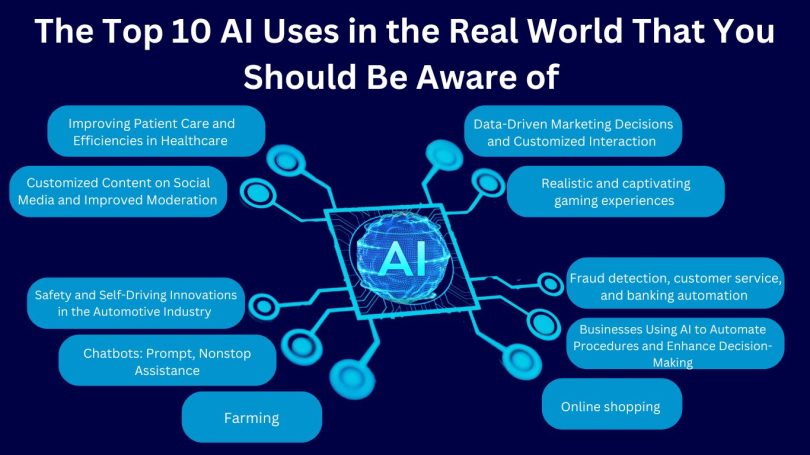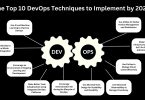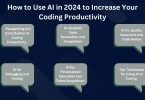Artificial intelligence (AI) is redefining a number of industries, blending effortlessly into our daily lives and changing the way that activities are completed. AI is accelerating digital transformation in a number of industries by utilizing methods including natural language processing, deep learning, and machine learning. These are the top ten real-world AI applications that are now having a big influence.
1. Improving Patient Care and Efficiencies in Healthcare:
AI is significantly improving healthcare services. Artificial intelligence (AI) tools are revolutionizing patient care by helping with complex medical procedures and automating administrative work. Wearable technology for extensive health monitoring, natural language processing for medical note transcription, and robotic surgery powered by AI are a few examples. Large volumes of medical data are also analyzed by AI algorithms, which helps with early disease identification and individualized treatment regimens, ultimately leading to better patient outcomes.
2. Online shopping:
Operational optimization and personalized shopping:
Artificial Intelligence (AI) improves inventory management and offers individualized recommendations to improve the e-commerce purchasing experience. Dynamic pricing algorithms help maximize sales and customer pleasure, and AI-powered virtual assistants provide personalized, real-time customer interactions. AI is being used by big businesses like Amazon to improve efficiency and provide a more personalized shopping experience.
3. Farming:
Maximizing Resource Utilization and Boosting Output:
Through resource optimization and increased food production, AI is helping to address important difficulties in agriculture. Cutting-edge artificial intelligence (AI) technology, like the See & Spray robot from Blue River Technology, use computer vision to precisely spray pesticides, increasing agricultural productivity and decreasing waste. With the use of AI-powered soil monitoring and predictive analytics, farmers can make better decisions that boost sustainability and production.
4. Data-Driven Marketing Decisions and Customized Interaction:
AI transforms marketing by making data-driven choices and individualized client interactions possible. Artificial intelligence (AI) algorithms examine customer behavior to develop focused marketing campaigns, enhance advertising tactics, and monitor real-time data to facilitate improved decision-making. This improves brand loyalty and conversion rates by raising customer involvement and the efficacy of marketing initiatives.
5. Customized Content on Social Media and Improved Moderation:
By tracking user behavior and customizing information distribution, artificial intelligence improves social media platform user experiences. By customizing feeds to each user’s tastes, AI systems boost relevance and engagement. Additionally, to maintain a safer and more engaging social media environment, AI-driven content moderation systems assist in identifying and filtering problematic information.
6. Realistic and captivating gaming experiences:
Artificial Intelligence is transforming the gaming industry by producing more captivating and realistic experiences. Intelligent non-player characters (NPCs) that engage with players organically are powered by AI algorithms, which improves gameplay. Gamers have a richer and more engaging experience with games that are dynamic and personalized thanks to procedural content generation and adaptive AI.
7. Safety and Self-Driving Innovations in the Automotive Industry:
AI is leading the way in automotive innovation, especially with regard to the creation of self-driving vehicles. AI is used by businesses like Tesla and Waymo for decision-making, navigation, and processing sensor data. Artificial Intelligence (AI) is facilitating the development of driverless vehicles by improving driving safety, reducing traffic accidents, and optimizing driving routes.
8. Fraud detection, customer service, and banking automation:
AI improves financial services by detecting fraud, automating tasks, and providing customer assistance. AI-driven chatbots provide efficient customer service, while machine learning algorithms look at transaction trends to identify and stop fraud. In addition, AI helps with algorithmic trading and individualized financial counseling, which streamlines banking processes and raises client happiness.
9. Businesses Using AI to Automate Procedures and Enhance Decision-Making:
Businesses use AI to enhance customer connections, automate procedures, and do predictive analysis. Chatbots powered by artificial intelligence (AI) provide quick customer service, while machine learning algorithms enhance marketing and sales tactics. Through data-driven insights, artificial intelligence (AI) helps organizations improve decision-making, save operating costs, and increase productivity.
10. Chatbots: Prompt, Nonstop Assistance.
Man-made intelligence chatbots are reforming client support by presenting nonstop, continuous help. These chatbots give customized associations and increment consumer loyalty by utilizing normal language handling to comprehend and answer client requests. AI chatbots are getting better at answering complicated questions as they develop, which improves customer support even more.
In summary:
AI is revolutionizing a number of industries through task automation, increased productivity, and creative problem-solving. AI is advancing a wide range of industries, including healthcare, e-commerce, agriculture, and social media. Additionally, it is adjusting the manner in which we cooperate with innovation. Knowing about these uses demonstrates how AI has the power to transform routine tasks and enhance user experiences in a variety of industries. Adoption of AI will become more and more crucial as it develops for both individuals and enterprises.








